History of The Social Service Department - Now The Department of Clinical Social Work
Graduate Intern Program
The Mass General Clinical Social Work Department is committed to training the next generation of social workers to offer clinically excellent, compassionate, evidence-based, culturally competent and patient-centered care.
In the early 1900s, the social work movement in America created many programs and services that we largely take for granted today.
1905-1945
Social workers addressed the basic needs of the poor and immigrants, by promoting safety and sanitation initiatives. The early American social workers were also advocates for issues that continue to be goals of the profession today, such as increasing access to suitable housing and medical care, obtaining fair wages and providing health and life-skills education to the community. They worked to improve the experience of childbirth and were at the forefront of the movement to control alcohol and narcotic abuse. Early social workers recognized that poverty and lack of education could exacerbate illness, and were crusaders for social equality. Thus, social work and health care shared common goals and objectives, which fostered physician-social work relationships.
Dr. Richard Cabot a senior physician at Mass General hired Garnet Pelton a nurse in 1905 to provide social work services in the outpatient clinics. In 1906 Dr. Cabot met Ida Maude Cannon and hired her to jointly organize the nation's first hospital-based social work program. Of Cabot, Cannon commented, "He was presenting the idea of social service within the hospital where sick patients although separated from their home and families nevertheless cannot separate themselves from their personal problems." At the time Cannon was enrolled in the newly established Boston School for Social Work (now Simmons College). Upon her graduation in 1907 Cannon joined Cabot's staff as a permanent member.
Ida M. Cannon
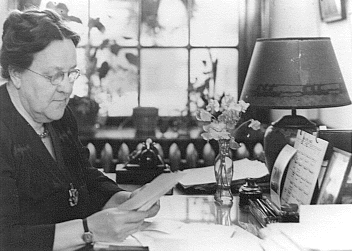
Cannon had previously been a visiting nurse but found her nursing skills insufficient to meet the psychosocial needs of her homebound patients and families. Cannon was profoundly influenced by Jane Addams after hearing her deliver a speech on the poor health conditions of children living in poverty. Addams became most noted for founding the settlement house movement in the United States with the opening of Hull House in Chicago. She was also instrumental in providing food and clothing to women and children of enemy nations which was socially and politically unprecedented. Addams' work so inspired Cannon, that Cannon redirected her professional energy from nursing to social work in health care.
In 1914 Cannon was named Chief of Social Work, the first organized social work department in a hospital. This was a significant appointment as only three Chiefs functioned in the hospital at that time, Chief of Medicine, Chief of Surgery and then Chief of Social Work.
At its inception and for the first ten years, social workers provided care in the out patient clinics. The focus was not only on the patients' medical care but also broadened to include community and environmental awareness as they impact patient care. Mass General social work services began by helping patients afflicted with neurological ailments, venereal disease and tuberculosis.
From its founding, the Social Service Department was interdisciplinary, including physicians, nurses, teachers and volunteers. Cannon's goals were to "make medical care effective" and in particular to "cure consumption", the term used for tuberculosis, which accounted for one-third of all deaths of people between the ages of 15 and 54. It inflicted severe emotional and economic strain on patients and families. Once it was revealed to be a communicable disease, a committee of social workers investigated the social correlates of tuberculosis, such as incidence, symptoms, severity and possible means of prevention, and then made recommendations which became integral parts of medical treatment. These Mass General social workers were the first professionals to perform a comprehensive analysis of tuberculosis in the United States.
The Mass General social workers also addressed the needs of unmarried pregnant adolescents and children with orthopedic problems. Cannon created specialized programming in the department and insisted that social workers have sufficient medical training and that nurses who wanted to be part of the department get training in social work. The department created innovative and eclectic programs, such as clay modeling classes for patients with "nervous disorders" (those we now identify as psychiatric disorders) and "hygiene education" primarily for adolescent girls and young mothers. They developed affiliations with convalescent homes, planned country outings for those with "nervous disorders" and researched the effects of lead poisoning. The department also established a low-cost lunch counter for patients and staff. Social work training emphasized understanding the individual in the larger societal context. Cannon studied the effects of occupation on disease and encouraged the social workers to examine how environment affected illness. Cannon was a strong advocate within Mass General for treating patients from the inner city, rather than depleting all the hospital's resources by treating affluent suburbanites who likely had access to other resources.
Cannon and Cabot implemented systems to measure social work interventions to document these interventions in medical charts, and to collaborate with medical professionals furthering the profession of medical social work. Their work promoted the expansion of the social work role in the hospital and the inclusion of the social perspective as a regular part of the medical treatment plan, e.g., they began what we know today as "rounds." In a 1930 address Cannon stated, "The medical social service movement recognized that there should be within the hospital, someone definitely assigned to represent the patient's point of view... And to work out with the physician, an adaptation of the medical treatment in the light of the patient's social condition." To realize this goal interdisciplinary rounds with social workers were begun, and continue to exist today.
In her effort to broaden the scope of the profession Cannon hired the department's first educational director Harriet Bartlett. Bartlett wrote the first medical social work textbook, Social Work Practice in the Health Field, and was also a well-known social researcher. She created educational programs which helped social workers clarify the function and quality of their work, and to broaden their professional growth. She also established supervisory processes social work student fieldwork and clinical case conferences. Her work and expertise became recognized beyond the department and the hospital and was adopted by the broader field of medical social work.
Cabot and Cannon successfully collaborated at Mass General for 40 years. They created a department that combined sound clinical practice with political action and community service. Cabot and Cannon traveled extensively throughout the United States and abroad, lecturing on their seminal work. They were both instrumental in the establishment of several national health care and social service programs. Additionally, Cannon helped develop a standardized program for training medical social workers.
Cannon also assisted in founding the American Association of Hospital Social Workers in 1918 and was the recipient of the Massachusetts Public Health Association's Award for Distinguished Service. Since 1971, the Ida M. Cannon Award has been presented annually to an administrator of a social work department in a health care setting who has demonstrated outstanding leadership. This is the highest award given by the Society for Social Work Leadership of the American Hospital Association. Many of Cannon's early principles of sound social work practice, especially her strong patient advocacy, continue to represent core values for practitioners of her profession more than 100 years later!
1945-1964
Cannon retired in 1945, and Josephine Barbor succeeded Cannon as chief. By then, the department was fully integrated into the hospital and included 31 social workers. Barbor was a proponent of education and research into the social needs of patients and families. She also was a strong advocate for her staff. She recognized the emotional strains for patients, families, and staff, incurred by constant exposure to serious illnesses. She had been a social worker on the front lines of World War I and saw the devastating effects that illness and trauma had on emotional health. One of Barbor's innovations was the creation of safe, private waiting rooms and meeting places within the hospital.
Barbor was also committed to working with the Supervisory Committee comprised of Cabot, other key physicians, ladies in the community (Ladies Visiting Committee) and hospital administrators, to secure hospital funding and oversee department work and finances. Today's endowments (funds to assist patients and their families) grew out of these early fiscal efforts. As the multidisciplinary approach to health care developed, physicians and nurses increasingly relied on social workers to address the interrelationship of physical, emotional and social factors in the diagnosis and treatment of diseases. Social work practice expanded to patients with polio, cancer, heart disease and venereal diseases. This was an exciting era for social workers because it was the first time they were fully integrated into patients' medical treatment. Their caseloads increased dramatically and the department was challenged to provide high quality treatment to a growing patient population with ever-increasing social needs. They adapted their practice, learned new techniques and continued developing trusting relationships with patients, while providing compassionate, competent care.
1964-1984
Eleanor Clark
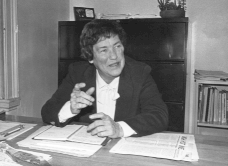 Eleanor Clark, who had also been a Mass General social worker, succeeded Barbor in 1964. Clark's expertise was in outpatient psychiatric social work and she led the department during an era of sweeping social reform. During Clark's tenure Medicare and Medicaid funding provided, for the first time, near universal access to health care for the nation's elderly and indigent populations. Noted for innovation Clark developed the Transfer Office and the Adult Foster Family Care Program. The Transfer Office assured continuity of care for patients from the hospital to the community through a team of social workers and continuing care nurses. The Adult Foster Family Care Program provided foster care as an alternative to nursing homes for elderly patients and was later expanded to include persons with disabilities and HIV. Together with a Mass General trustee, Mrs. Jane Mortimer Claflin, Clark was also instrumental in the creation of the Chelsea Health Center, which continues to be an integral part of that community.
Eleanor Clark, who had also been a Mass General social worker, succeeded Barbor in 1964. Clark's expertise was in outpatient psychiatric social work and she led the department during an era of sweeping social reform. During Clark's tenure Medicare and Medicaid funding provided, for the first time, near universal access to health care for the nation's elderly and indigent populations. Noted for innovation Clark developed the Transfer Office and the Adult Foster Family Care Program. The Transfer Office assured continuity of care for patients from the hospital to the community through a team of social workers and continuing care nurses. The Adult Foster Family Care Program provided foster care as an alternative to nursing homes for elderly patients and was later expanded to include persons with disabilities and HIV. Together with a Mass General trustee, Mrs. Jane Mortimer Claflin, Clark was also instrumental in the creation of the Chelsea Health Center, which continues to be an integral part of that community.
In early 1984, Eleanor Clark was promoted to Associate General Director of Mass General, the first woman to hold this position. She was given responsibility for designing and implementing hospital-wide programs for the elderly. Sadly, she died later that year. Named in her honor were Clark House Nursing Home and the public square adjacent to the former Chelsea Health Center which she had co-founded. An award for innovative program development was also created in Clark's honor by the national Society for Social Work Leadership in Health Care.
1985-2004
Evelyn Bonander
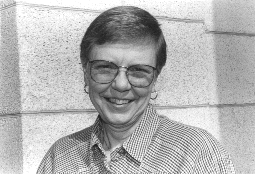 Evelyn Bonander followed Clark as chief in 1985. Continuing in the tradition of her predecessors, Bonander focused on strengthening clinical competence, creating socially relevant programs and combining research and practice. Under her leadership social work creatively and effectively responded to the increased pressures due to managed care, including managed health care initiatives, health care budget crises and subsequent changes in health care reimbursement and increasing patient care needs. She collaborated in the creation of a nurse case management role to assume accountability for medical discharge planning. The differentiation between case management and social work allowed social workers to assume greater clinical responsibility in patient care. Social work practice now focused on helping patients and their families with their psychosocial problems, emotional responses to illness and connecting them to supportive community programs.
Evelyn Bonander followed Clark as chief in 1985. Continuing in the tradition of her predecessors, Bonander focused on strengthening clinical competence, creating socially relevant programs and combining research and practice. Under her leadership social work creatively and effectively responded to the increased pressures due to managed care, including managed health care initiatives, health care budget crises and subsequent changes in health care reimbursement and increasing patient care needs. She collaborated in the creation of a nurse case management role to assume accountability for medical discharge planning. The differentiation between case management and social work allowed social workers to assume greater clinical responsibility in patient care. Social work practice now focused on helping patients and their families with their psychosocial problems, emotional responses to illness and connecting them to supportive community programs.
Bonander was instrumental in the founding of a new and highly specialized program for survivors of domestic violence called HAVEN, Hospitals Helping Abuse and Violence End Now. This program has become an integral patient care program and has received community-wide recognition.
The Mass General Social Service Department can also be credited for continuing to uphold its original mission despite fiscal pressures and budgetary constraints: strong clinical care, programs that address current psychosocial issues, and ongoing research and education.
Clinical social workers are currently assigned to all inpatient-patient care units, to key ambulatory practices, the Emergency Department and to all Mass General community health care centers and outreach programs. In each of these arenas we strive to make medical care effective by ensuring that the psychosocial, emotional and financial needs of our patients are fully addressed. Throughout its history the Department of Clinical Social Work has continued to be responsive to the epidemics of the times. Programmatic innovation was the response to social problems of the day. Consumption (tuberculosis) was the "social epidemic" of the early 1900s. Today's services address HIV-related care; the abuse and neglect of children, elders and disabled persons; domestic violence; palliative care for the seriously ill; perinatal loss; trauma and burns; and elder home care. We facilitate support groups and peer support networks. Throughout its existence, professional and compassionate clinical care for patients and families has remained the central mission of the Massachusetts General Hospital Department of Clinical Social Work.
2005-2011
Ann Daniels

Ann Daniels joined the Social Service Department in the early 70s as a Unit Supervisor, providing direct care to individuals, families and groups as well as supervision to MSW interns and responsibility for social work staff of an integrated program providing mental health crisis intervention and urgent care in Ambulatory Primary Care practices and Emergency Services. In 1984 Daniels became the Associate Director of the Department, responsible for daily operations of social workers in billable Mental Health, Primary Care, Child and Adult Psychiatry, Pediatrics, Obstetrics, and Emergency Services. She also became the director of Social Work training. In 1995 Daniels became the Clinical Director of the Department, with clinical and operational responsibility for all social workers in the department. Daniels set practice standards and scope, chaired department and hospital committees, including being the inaugural Co-chair of the Clinical Recognition Board and serving as a member of that planning group and steering committee. She continued as the Director of Training, significantly expanding our MSW intern program to contract and partner with several graduate schools of social work as well as formalizing the didactic and clinical components of our training program and the consultation provided to supervisors.
In 2005 Daniels became the Director, with responsibility for both the Social Work and Spiritual Care Departments until her retirement in 2011. She ensured clinical social workers continued to be in the forefront of their profession, initiating new programs and services to meet the changing needs of our patients and families, and expanding our reach and span within and beyond the walls of MGH, locally, nationally and internationally.
In addition to her clinical and leadership achievements, Daniels was a researcher and educator. Daniels was our first Director to hold a PhD. She was the Co-Principal Investigator for multiple research projects including a Robert Wood Johnson Demonstration Project in Coordinated Care for the Elderly. Daniels published numerous articles and presented nationally on a range of topics including “Women as Social Work Leaders and Managers” and “The Learning Organization and Strategic Departmental Design”. Daniels held several academic appointments at schools of social work and taught Psychosocial Dimensions in Health and Human Behavior in the Social Environment courses at Boston College School of Social Work. Daniels was also an Instructor and Field Practicum Coordinator at the MGH Institute for Health Professions.
2011-2021
Marie Elena Gioiella
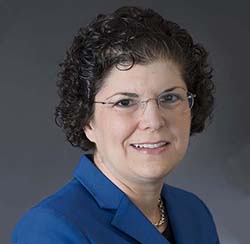
Marie Elena Gioiella received her BA in psychology from the College of the Holy Cross. She then served in the Jesuit Volunteer Corps: South (New Orleans, LA). Gioiella’s experience working with people living with HIV and AIDS as a Jesuit volunteer led her to pursue and earn dual Master of Social Work and Master of Arts in pastoral ministry degrees from Boston College.
Gioiella began her career at Mass General in 1994, as an Oncology Social Worker, working for 12 years counseling people living with cancer and their families, during which time she developed specialized expertise in the experience of, and coping with, ovarian cancer. During this period Gioiella completed an American Cancer Society Post Master’s Fellowship in psychosocial oncology.
In 2006 she served as the inaugural Clinical Director of the Mass General Oncology Social Work program before being appointed Director of the Social Service Department in 2011.
Gioiella received a number of honors over the course of her tenure at Mass General, including the Domestic Violence Unsung Hero Award, the Arthur and Susan Durante Award for Exemplary Care and Service with Cancer Patients, and the Stephanie Macaluso Expertise in Clinical Practice Award. Gioiella was recognized as a Clinical Scholar by the Mass General Clinical Recognition Review Board and has subsequently served on this inter-professional Board for over 12 years.
2021 to Present
Carmen Vega Barachowitz
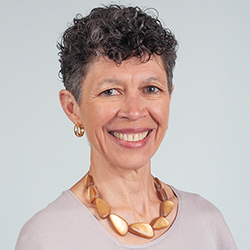 In April 2022, Carmen Vega-Barachowitz, MS, CCC-SLP, FASHA, was named the Director of Clinical Services. In this new capacity, Vega-Barachowitz has oversight of Speech, Language and Swallowing Disorders & Reading Disabilities, Medical Interpreters, Spiritual Care, and Social Service.
In April 2022, Carmen Vega-Barachowitz, MS, CCC-SLP, FASHA, was named the Director of Clinical Services. In this new capacity, Vega-Barachowitz has oversight of Speech, Language and Swallowing Disorders & Reading Disabilities, Medical Interpreters, Spiritual Care, and Social Service.
As the Director of Social Service since August 2021, Vega-Barachowitz has fostered an environment of professionalism and compassion as she has done in the other health professions departments she leads. Vega-Barachowitz is a passionate advocate for our patients and their families, tirelessly working to make Mass General a more welcoming and inclusive place for patients and staff alike. Under Vega-Barachowitz's leadership, the Departments of Speech, Language and Swallowing Disorders, Spiritual Care, Medical Interpreters and Clinical Social Work have embraced patient- and family-focused care and continuously achieve evidence-driven outcomes.
Vega-Barachowitz shepherded the renaming of the department in 2024 to the Department of Clinical Social Work to better reflect the clinical nature of our work.
As a champion for diversity and inclusion efforts throughout Patient Care Services and the hospital at large, Vega-Barachowitz has been instrumental in furthering the mission of providing the highest quality of patient care, education, research and community outreach. She is a member of the Mass General Executive Committee on Diversity and Equity (ECODE).
Vega-Barachowitz has an appointment as Assistant Professor at the MGH Institute of Health Professions and serves on the Board of Directors of the Bunker Hill Community College Foundation.
Vega-Barachowitz has received several awards including the American Speech-Language-Hearing Association (ASHA) Diversity Champion Award, 2009 Ernesto Gonzalez Award for Outstanding Service in the Latino Community, and 2010 Boston Business Journal Champions in Health Care. In 2015, she was inducted as a Fellow in the American Speech-Language-Hearing Association (ASHA). In Fall 2022, Vega-Barochowitz formally celebrated her recognition as the inaugural MGH Trustee Endowed Scholar in Speech, Language and Swallowing Disorders using the funds to advance the profession — a celebration postponed due to the pandemic.
References
- Bartlett, Harriet M. (1961). Social work practice in the health field. National Association of Social Work.
- Cabot, Richard C. (1912). Social services and the art of healing. Moffat, Yard, & Co. New York, NY.
- Cannon, Ida. (1952).On the Frontier of Medicine: Pioneering in Medical Social Service. Harvard University Press. Cambridge, MA.
- Massachusetts General Hospital Department of Social Services. (1958). Selected Papers and Reports: Fiftieth Anniversary Celebration of the Social Service Department at Massachusetts General Hospital. Boston, MA
- Trattner, Walter. (1994). From Poor Law to Welfare State; A History of Social Welfare in America (5th edition). The Free Press. New York, NY.
- Hensley, S., Jaklevic, M.C., Pallarito, K., Shinkman, R., and Snow, C. (1997). Health Care Hall of Fame. Modern Healthcare. Clark W. Bell.
